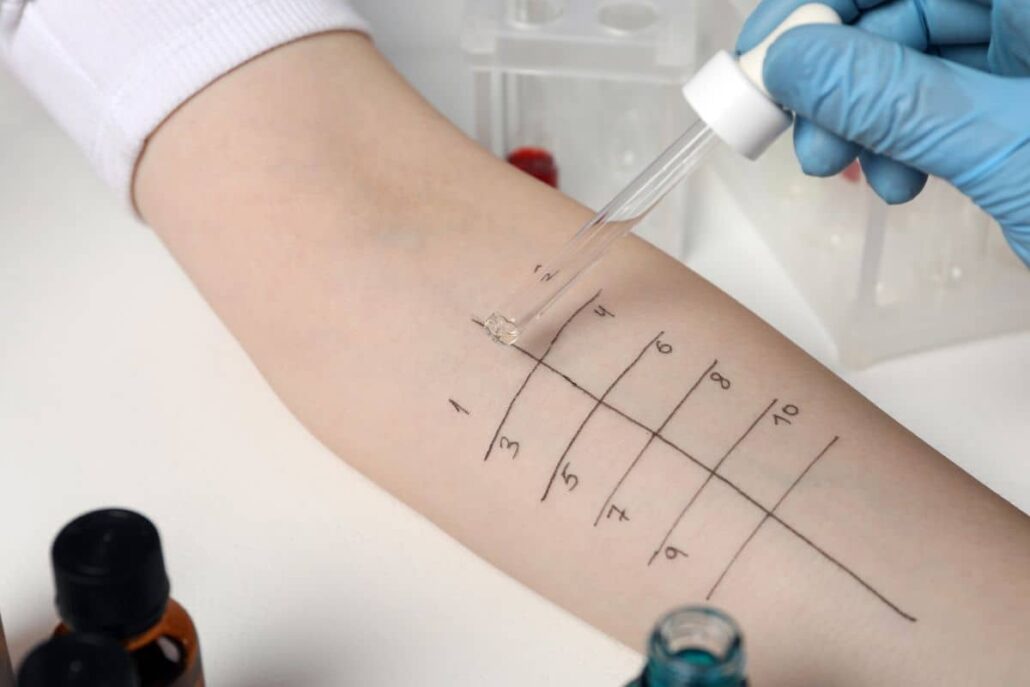If you’ve ever wondered whether your runny nose, itchy eyes, or skin flare-ups are caused by allergies, getting tested is the first step toward real relief. Today, there are many allergy test types — from skin prick testing to detailed blood panels — designed to identify your specific triggers. But with so many options available, how do you know which one is right for you?
At Becker ENT & Allergy in Princeton, NJ, our experienced Allergy specialists offer a comprehensive range of diagnostic techniques to help patients of all ages get answers and lasting allergy relief. Whether you’re exploring allergy testing for kids or wondering what is the most accurate allergy test, our experts tailor each test to your unique symptoms, history, and health needs.
Understanding the different types of allergy tests — and when to consider each — can help you pinpoint triggers and find lasting relief.

Quick Facts About Allergy Testing
- Allergy testing helps uncover specific triggers behind symptoms like sneezing, hives, or congestion.
- Common allergy test types include skin prick, intradermal, patch, and blood tests.
- Allergy testing for kids is safe and can be customized to their comfort level.
- The most accurate allergy test depends on your symptoms, medical history, and type of allergen.
- At Becker ENT & Allergy in Princeton, a team of experienced ENT and Allergy specialists provides expert testing and personalized treatment plans.
Do You Actually Need an Allergy Test?

Not every sniffle is caused by allergies — but if your symptoms are recurring, seasonal, or triggered by specific environments, testing can make all the difference. Allergy testing is recommended when you experience a range of symptoms such as nasal congestion, itchy or watery eyes, persistent coughing, hives, or eczema that doesn’t respond well to over-the-counter antihistamines.
You may also want to consider testing if you:
- Have ongoing sinus infections or asthma flare-ups.
- Notice symptoms that worsen in certain places (like outdoors, at work, or around pets).
- Experience itching or swelling after eating certain foods.
- Suspect insect stings or medications cause allergic responses.
- Have had sinus surgery and symptoms continue to flare
Some patients delay testing until allergy symptoms interfere with daily life — but early diagnosis allows you to manage triggers and prevent more severe allergic reactions such as anaphylaxis. Children with eczema or family histories of allergies should often be evaluated sooner to minimize long-term complications.
Types of Allergy Tests
Allergy testing isn’t one-size-fits-all. Different types of allergy tests are used depending on your symptoms and suspected triggers. Each method measures how your immune system reacts to potential allergens — substances that cause allergic symptoms when your body produces specific antibodies called IgE (immunoglobulin E).
Below are the main diagnostic techniques used by Becker ENT & Allergy specialists to identify specific allergens:
Skin Prick Test (SPT)
The skin prick test, also known as a puncture or scratch test, is one of the most common, efficient, and sensitive ways to detect immediate allergic reactions. During the test, a small drop of allergen extract (like pollen, dust mites, pet dander, or specific foods) is placed on your skin — usually your forearm or upper back. The skin is then gently pricked so the allergen can enter just beneath the surface.
If you’re allergic to something, a small red bump or hive typically appears at the test site within 15 to 20 minutes. The test is safe, quick, and provides same-visit results, making it ideal for evaluating common environmental or food allergens.
Skin prick testing is often recommended when:
- You have seasonal symptoms related to pollen.
- You experience indoor allergies (dust mites, mold, pets).
- You need results before starting new treatment like immunotherapy.
- You need to know if you are allergic to specific foods.

Blood Test (Specific IgE)
For patients who cannot undergo skin testing — due to skin conditions, certain medications, or severe allergic responses — a blood test can be an excellent alternative.
The specific IgE test measures antibody levels to various allergens. Unlike the skin prick test, this method does not expose you directly to allergens. Instead, a blood sample is sent to a laboratory, where it’s analyzed for immune reactions.
This option is especially useful if you:
- Have eczema or dermatitis that makes skin testing difficult.
- Are taking antihistamines or medications that interfere with skin reactions.
- Need to screen for multiple allergen types, including environmental allergies, multiple specific foods or insect stings.
- Want to track a food allergy over time to see if it has been outgrown
While results take longer (a few days), blood testing can identify a wide range of potential triggers and/or help confirm skin test findings.
Intradermal Test
Intradermal allergy testing involves injecting a small amount of allergen extract just beneath the skin’s surface. It’s a more sensitive method than a standard skin prick test and can detect allergic responses that may not appear otherwise.
This method is used selectively — most often when evaluating:
- Allergies to insect stings (like bees or wasps).
- Reactions to certain medications.
- Environmental allergens that came up negative on skin prick testing
Because intradermal testing is highly sensitive, it carries a slightly higher chance of producing false positives and reactions, so it’s typically performed only when medically appropriate.
Patch Test

The patch test is primarily used to identify contact allergies — skin reactions caused by materials such as metals, fragrances, or latex. Small patches containing suspected allergens are placed on your back and left in place for 48 hours.
If your skin becomes red, itchy, or develops small bumps after removal, this indicates a delayed hypersensitivity reaction. Unlike the skin prick test, which detects immediate responses, patch testing identifies slower allergic reactions often linked to eczema or occupational exposures.
Food Challenge (Supervised)
A food challenge is considered the most definitive way to diagnose food allergies. Under close medical supervision, you’ll consume small, measured amounts of the suspected allergen after skin and/or blood testing has been done. The test is performed in a controlled clinical environment where emergency treatment is available in case of a reaction.
Because it carries a higher risk, this diagnostic technique is only done when other tests are inconclusive or when your allergist needs to confirm tolerance to certain foods. It’s commonly used to evaluate allergies to peanuts, eggs, milk, or shellfish.
At Becker ENT & Allergy, food challenges are performed with careful monitoring to ensure safety at every step, often as part of a broader plan that may also include an elimination diet to identify specific food triggers.
Find out which test is safest and most accurate for you
Schedule an evaluation with our allergy experts.
Allergy Testing for Kids
Allergy testing for kids can help identify triggers early — improving their comfort and quality of life. Children may benefit from testing if they experience persistent rashes, frequent colds, wheezing, or digestive upset after eating specific foods.
At Becker ENT & Allergy, our pediatric-friendly approach ensures kids feel safe and comfortable. Skin prick testing is usually preferred because it’s quick, minimally invasive, and provides immediate results. For children with sensitive skin or anxiety about skin pricks, a small blood draw may be ordered instead.
Knowing your child’s specific allergens allows parents and doctors to create a personalized plan that includes trigger avoidance, medication such as antihistamines, or immunotherapy for long-term relief.

What Is the Best Allergy Test for You?
There’s no single “best” allergy test for everyone. The recommended allergy test depends on your individual symptoms, medical history, and suspected triggers.
In general:
- Skin prick tests are best for common airborne or food allergens.
- Blood tests work well if you can’t stop taking medications or have skin conditions.
- Patch tests help identify contact allergies.
- Food challenges confirm or rule out food sensitivities.
Your Allergy specialist will review your medical history, lifestyle, and allergic symptoms to determine the most suitable combination. Sometimes, multiple tests are used together to build a complete picture of your allergic responses.
Why Choose Becker ENT & Allergy?
At Becker ENT & Allergy, you’re not just getting a test — you’re gaining access to a team of experienced ENT and allergy experts who provide comprehensive, individualized care.
Our Princeton offices, conveniently located on Ewing Street and within the Princeton Medical Arts Pavilion, offer full diagnostic and treatment services for allergies, asthma, sinus issues, and related conditions.
Patients choose Becker ENT & Allergy because we:
- Use state-of-the-art diagnostic techniques.
- Offers same-day results for most skin testing.
- Develop personalized treatment plans based on your test results.
- Provide integrated care for nasal, sinus, and allergy conditions in one place.
If you’re struggling with symptoms that affect your breathing, sleep, or quality of life, early testing at a trusted practice can make a lasting difference.
How to Prepare for Your Allergy Test

Preparing for your allergy test helps ensure accurate results. Several days before your appointment, you may need to stop taking antihistamines or certain medications that could interfere with testing. Your Allergy provider will give specific instructions based on your medical history.
Additional tips include:
- Wear short sleeves or clothing that allows easy access to your arms.
- Avoid applying lotions or perfumes to test areas.
- Inform your doctor about recent illnesses or infections.
- For children, bringing a favorite toy or book can make the experience more relaxed and positive.
Get Personalized Treatment for Allergies
Once your allergy test results are ready, your Becker ENT & Allergy specialist will walk you through what they mean. Together, you’ll create a treatment plan tailored to your specific allergens — whether that includes medication, lifestyle adjustments, or advanced options like allergy immunotherapy.
By pinpointing your triggers, you can finally move from guessing to managing your allergies with confidence. Many patients start to notice relief within weeks, especially with personalized follow-up care from our Princeton team.
Take the First Step Toward Lasting Allergy Relief
Allergy testing can uncover the hidden reasons behind your symptoms and open the door to more effective treatment. Whether you need answers for yourself or your child, Becker ENT & Allergy in Princeton, NJ, provides compassionate, expert care from diagnosis to long-term relief.
Don’t wait for another season of discomfort. Schedule your personalized allergy test with one of our Allergy specialists today — and take the first step toward clearer breathing and better health.

